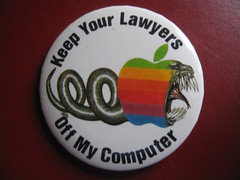
I'll admit it, I'm a bit idealistic. I have a strong pragmatic/practical side as well though so I'm not the type to talk about "peace and love" without putting up some kind of framework to explain/justify why I think a particular approach makes sense.
I'm also not totally anti patent. Patents were a noble experiment that made a lot of sense when they were first instituted and spurred innovation and progress. The reality today is all together different, particularly in the case of software patents which almost never make sense and do not encourage innovation or progress.
Some might argue that patents encourage a meritocracy. At this stage I think it's more accurate to say that they encourage a moneytocracy and Lawyertocracy which isn't good for anyone but the Lawyers in the long term.
It's one thing to acquire patents to protect yourself, that's just the cost of doing business these days. It's another to use those patents in an attempt to bludgeon your competition outside of the market place.
Apple seems to be the latest company to fall victim to the lure of litigation as a means to secure market positioning. They are hardly the first and they won't be the last. Still it's disappointing to see a company that is so strong in their core competencies of marketing and innovation go down this path.
Litigation can be a core competency if you want it to be but particularly for a technology company this seems like a mistake to me. Intel was known for their prowess in litigation for many years. Eventually they were also known for their mediocre technology and marketing which is why AMD was able to sneak up on them and usurp the architecture of the X86 processor family for several years. Which is in turn why we use AMD's 64 bit extensions in "Intel Compatible" processors including those made by Intel itself. As an aside, the Intel Itanium processor may have been a nice piece of technology but it was a lousy choice for Intel's customers which is why it never gained wide scale acceptance. From Intel's perspective it was great since it was going to finally kill off the clone processors that had bedeviled them for a decade plus at the time but outside of Intel that was viewed with ambivalence at best and outright hostility in many cases. Consumers like competition and choice. Short sighted companies don't and that works to their detriment.
Intel has pretty much always had around eight to ten times the financial resources of AMD yet time and again they've been trumped by the smaller company. Intel has done better in recent years but I contend they never would have gotten themselves into the messes they did if they hadn't spent so much time, energy and focus trying to eliminate their competition through the courts while failing to create as many innovate products as they should have. For example, Intel's inability to create a credible high end GPU is hurting them to this day.
This isn't the first time Apple has gone the lawsuit route in a big way. If you've been around for awhile you may recall their battle with Microsoft back in the late 80's and early 90's. When Jobs eventually returned to the fold Apple was weeks away from liquidating their remaining assets and going out of business. It would be unfair to assert that suing Microsoft was the sole reason for their near demise but I do think it was a pretty clear indicator that Apple was getting distracted and focusing energy in the wrong direction.
You have to keep an eye on your competition, that's common sense; but if you're not keeping the majority of your attention on your customers you're making it easier for someone else to capture their hearts and minds. Apple's increased litigation against their competitors could be a sign that they are starting to lose their way again. Given their current very robust financial situation that isn't a big deal in the short term but I don't see how it can end well.
Image by mary hodder via Flickr

Google buying Motorola Mobility is an interesting development and very apropos to what I was talking about in regards to the potential downsides of Apple focusing so much on litigation. The war has just escalated.
ReplyDeleteWithout patents it would be impossible for any of us to strike it rich with an invention. Big companies could just watch people and steal their stuff as soon as it's done. There would be no way to compete with them. Patents are also extremely important to these companies because they "define" who they are. If anyone could make an iPhone it wouldn't be an iPhone (I hate Apple btw).
ReplyDeleteScott, Thank you for the comment!
ReplyDeleteThat is the ideal and the original intent of patents. The reality seems to be much different today, particularly in the area of software patents. Companies spend a lot of time and money applying for patents primarily as a defensive measure to build their war chest of patents so they can defend themselves when their inevitable day in court comes. Most software patents are for things that are obvious and/or have been widely used for years if not decades.
I'm not saying there isn't some software related concept out there that would be worthy of a patent but if there is I haven't heard of it.
The look at least of Apple's iPhone is protected by another legal mechanism. I believe it's a variation of trademark that allows companies to claim ownership of the particular look and feel of their hardware but I'm drawing a blank right now.
Maybe it's different on the hardware side of things. I'm not very knowledgeable about that. Even in that case though patents seem to be used primarily as a bludgeon by large companies and the occasional patent trolls.